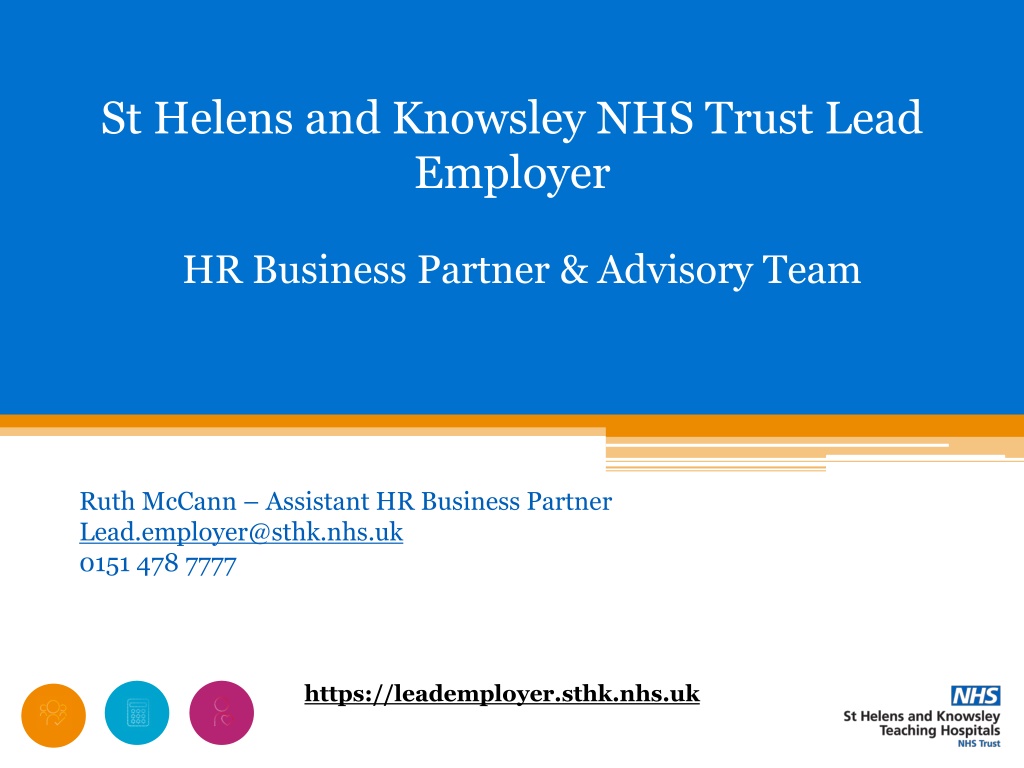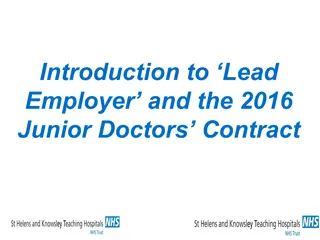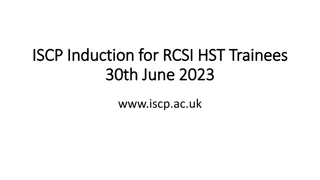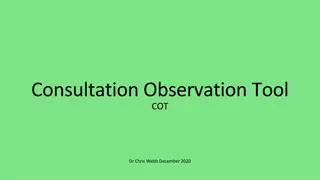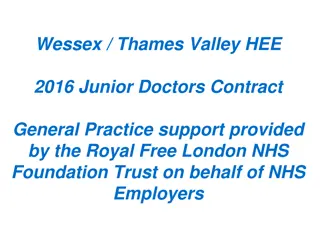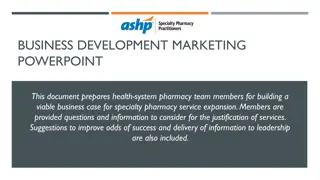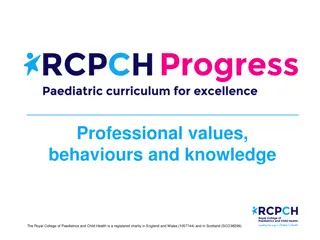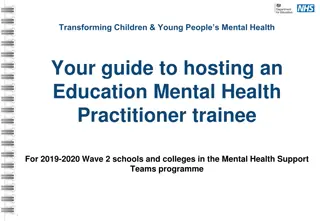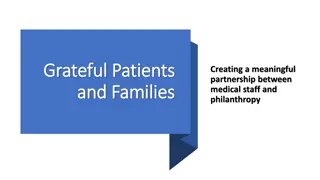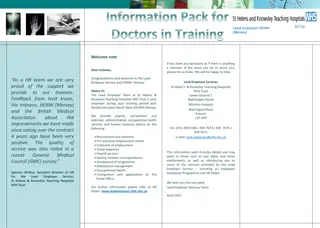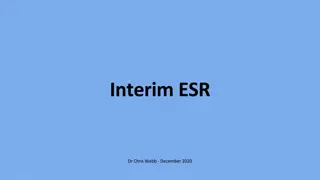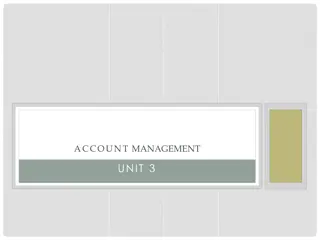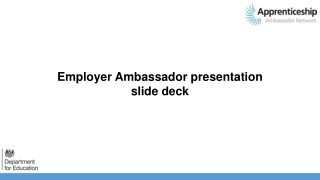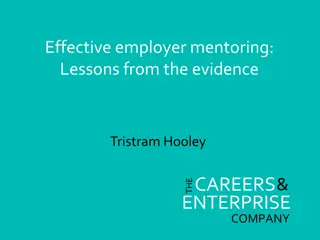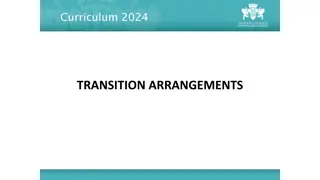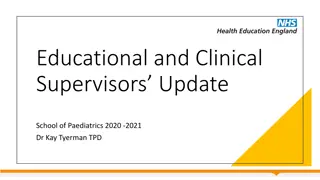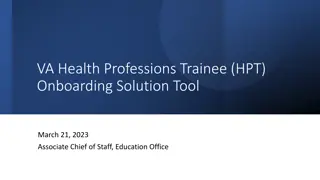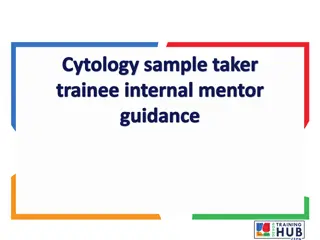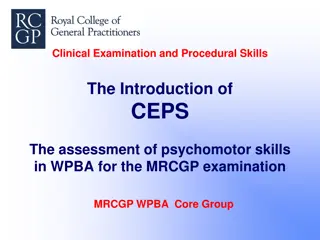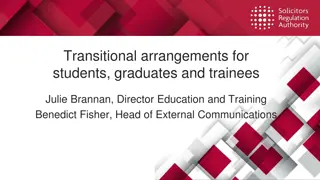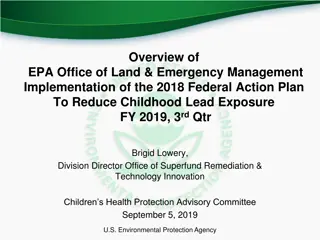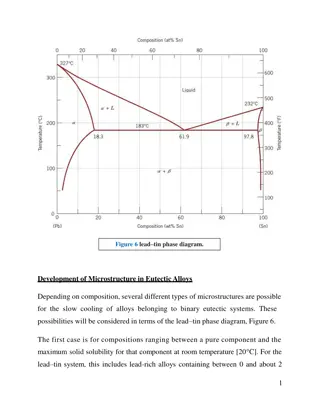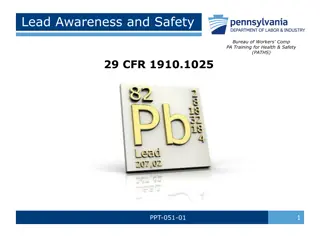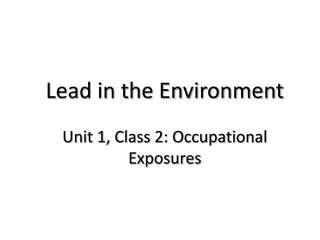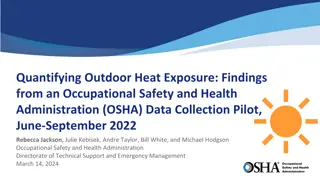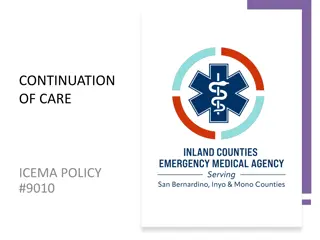Lead Employer HR Support for Specialty Trainees in Healthcare
St. Helens and Knowsley NHS Trust serves as the Lead Employer for over 12,500 specialty trainees, offering HR support, health and well-being services, and intervention through their HR Advisory Team. The team provides guidance on key HR policies, manages long-term sickness cases, and collaborates with Health Education England. They focus on early intervention and support for trainees requiring extra assistance, addressing education, conduct, and health issues to ensure the well-being of doctors in training.
Download Presentation

Please find below an Image/Link to download the presentation.
The content on the website is provided AS IS for your information and personal use only. It may not be sold, licensed, or shared on other websites without obtaining consent from the author. Download presentation by click this link. If you encounter any issues during the download, it is possible that the publisher has removed the file from their server.
E N D
Presentation Transcript
St Helens and Knowsley NHS Trust Lead Employer HR Business Partner & Advisory Team Ruth McCann Assistant HR Business Partner Lead.employer@sthk.nhs.uk 0151 478 7777 https://leademployer.sthk.nhs.uk
WHO ARE WE? Lead Employer for c, 12,500 specialty trainees: Our Lead Employer Model is focused on improving the working lives of Doctors in Training. To support trainees we cover a broad range of services including HR, Payroll, Health Work and Wellbeing and many more, 12,500 trainees are spread over more than 8 HEE regions around the country The Lead Employer model is a collaborative one, with the responsibilities of the traditional employer shared between three major stakeholders, who are: Lead Employer Employer Host Organisation - NHS Trusts / GP Practice / Hospices and any other approved training placements are the Host Organisation location where the trainee works and carries out their training. They provide day to day supervision Health Education England - Oversees the education for Specialty Trainees https://leademployer.sthk.nhs.uk
HR Advisory Team Intervention Provide HR advice and support Provide support and guidance with Health, Work and Wellbeing (HWWB) referrals Provide guidance about key HR policies including attendance management, conduct, grievance, dignity at work and Handling Concerns Policy (MHPS) . Manage long term sickness cases in line with Trust policy. Link in with HEE regarding the on-going management and support of trainees. Focus on prevention and identification of trends and themes alongside LE Medical Director Timely intervention and collaboration is key! P o l i c y g u i d a n c e ADVICE S U P P O R T https://leademployer.sthk.nhs.uk
Trainee Requiring Extra Support Colleagues from the Lead Employer HR Business Partner and Advisory team meet with Heads of School and Associate Deans on a monthly basis to discuss any trainees requiring extra support that appear on the TRES / Head of School reports. The TRES process considers cases on an individual basis. There are three broad categories which the group use when reviewing individual referrals as follows: Education Conduct Health Problems that are of a straight forward nature, will generally be handled by the Local Education Providers and will be dealt with by individual Education Supervisors, the LE HWWB department and/or Director Medical Educational/Medical director. Where matters of Conduct or Clinical Governance are highlighted then in these circumstances please contact the Lead Employer HR Business Partner and Advisory Team at the earliest opportunity to enable concerns to be handled in an appropriate manner. The main purpose of any intervention is to provide support and where possible agree remedial action plans for doctors in training. Where possible the aim is to resolve concerns through on-going assistance and support. It is recognised that early intervention and offering appropriate support can prevent concerns escalating whereby formal intervention is necessary. The TRES / Head of School meetings are designed for LE and HEE to jointly agree appropriate mechanisms for supporting cases and clear actions are noted including agreement of communication to be cascaded to relevant parties. In the event that it is recognised that a trainee may benefit from additional support, the Lead Employer HR Business Partner and Advisory team will liaise with the trainee, HEE and HWWB to identify the most appropriate support for the trainee and ensure that this is implemented in a timely manner. We strive to provide an effective, fair & supportive model for any trainee requiring extra support.
Trainee Requiring Extra Support When would you refer a trainee to the Lead Employer HR Business Partner and Advisory team? When a trainee indicates that they require extra support during the course of their training. When a trainees demonstrates behaviour that is a cause for concern - no matter how trivial this may appear. When you are made aware of concerns regarding the trainees physical and/or mental health. What are the triggers for raising concerns? Sudden out of character behaviour e.g. displays of aggression/ defensiveness, inability to compromise/ accept criticism, slowness undertaking procedures, serious one offs that are rationalised by the trainee e.g. a small lie, difficulty with exams, uncertainty about career choice, frequent lateness, excessive amounts of sick leave, difficulty prioritising/ undertaking normal day to day duties, junior colleagues avoiding their opinion or help, excessive exception reporting How to raise concerns? The LE HR Business Partner and Advisory team in conjunction with AD and HoS may request that a trainee is reviewed at TRES / Head of School meetings. In circumstances where concerns arise, the Host organisation or Health Education England should make contact with the appropriate HR colleague in the Lead Employer HR Business Partner and Advisory team to discuss the concerns further to ensure that appropriate support is offered to the trainee. HEE (AD and HoS, sometimes TPD) will form a view regarding whether or not the trainee meets the criteria of TRES. . If you are unsure as to whether a concern should be raised to the Lead Employer, it is always better to discuss with a member of the Lead Employer HR Business Partner and Advisory team. Early intervention is key and no concern is too minor to seek advice from the Lead Employer HR Business Partner and Advisory Team. The team can be contacted via the Lead Employer Helpdesk at Lead.Employer@sthk.nhs.uk or on 0151 478 7777 (Monday Friday 9am-5pm).
Support Networks Health, Work & Well-Being (Occupational Health Service) Self-Referral facility Management Referral facility 0151 290 1958 HWWB.admin@sthk.nhs.uk Practitioner Health Programme https://www.practitionerhealth.nhs.uk/ Employee Assistance Programme Vita Health 03001312067 Password: STHKWELL The whole network of LE support services can be found at: https://leademployer.sthk.nhs.uk/traineesupport https://leademployer.sthk.nhs.uk
Health, Work and Wellbeing (HWWB) Our Health, Work and Wellbeing service (HWWB) provide advice and support around matters relating to our colleagues in Training wellbeing, including their physical and non-physical health. HWWB recognise the unique concerns that our colleagues in Training may face as a medical professional, and the pressures both inside and outside of work. HWWB are proud to offer an extensive service throughout all aspects of our trainee s employment and training journey. Details of support services available to trainees via our Health, Work and Wellbeing service can be found on the Lead Employer website here: https://leademployer.sthk.nhs.uk/health-work-and-wellbeing Referrals to our HWWB service can be made directly by the host organisation via our Cohort system. Further information regarding this process can be found on the Lead Employer website here https://leademployer.sthk.nhs.uk/cohort-for-hosts Wellbeing Referrals can be also made directly from Trainee to Lead Employer using the request form on our Shared Services website: https://leademployer.sthk.nhs.uk/wellbeing-referral-form https://leademployer.sthk.nhs.uk
Handling Concerns There will be circumstances where concerns arise in relation to Doctors-in-training who are placed within Host Organisations. If concerns are raised in relation to a Lead Employer Doctor, we will support host organisation s to handle concerns in line with the Handling Concerns policy and procedure. Concerns raised may include matters relating to, for example: The conduct, health or capability of the Doctor in training Concerns raised by a Doctor in training in relation to a colleague employed by the Host Organisation Concerns regarding education and training Safeguarding matters General Medical Council (GMC) Fitness to Practice concerns or investigations Serious Untoward Incidents (SUI s) or Never Events Concerns raised by patients or families in relation to the care provided by the doctor in training Police matters In all of the above circumstances, it is vital to notify the HR Business Partner and Advisory team at the earliest opportunity to enable prompt resolution of any concerns raised and to ensure that appropriate and timely support is available to the Doctor. If unsure as to whether a concern should be raised to the Lead Employer, it is always better to discuss with a member of the HR Business Partner and Advisory team. https://leademployer.sthk.nhs.uk
Long Term sickness A period of long term sickness is classed as 28 days or more. Fit notes must be submitted by the trainee to cover the whole of the period of their absence. LE are notified via ESR, which is why it is imperative that hosts report in real time to ensure that we can support trainees accordingly. Trainee s will receive a wellbeing call after 4 weeks of absence by a member of the HR Advisory team and will then be referred into HWWB for additional support. Welfare calls will take place every 4 weeks with the trainee, HR Advisor and Clinical supervisor, this will be the case until the trainee return s to work. For more complex sickness cases, or those that bridge a rotation, their TPD might be asked to attend as a HEE representative. Once a trainee has been classed as fit to return to work by HWWB, a return to work welfare meeting will be arranged. In this meeting a phased return to work plan and amended duties will be discussed and implemented based on the individuals needs and what the host organisation can accommodate. Under the Attendance Management policy, a phased return to work must be accommodated by annual leave i.e. if full time and returning work 2 days within the week then 3 days would be classed as annual leave.
Neurodiversity We recognise 'neurodiversity' as the way in which everyone s brains naturally work differently from one another. Just as you may be born right-handed or have green eyes, how your brain works and where you sit on the cognitive spectrum will be unique to the trainee. Most people are neurotypical or not neurodivergent , which means they think and behave in a way that society traditionally considers normal . However, around 1 in 7 people are neurodivergent, meaning that they behave, think, process, and interpret information in ways that differ from most other people Traditional working practices are often designed with a neurotypical society in mind, which can make it difficult for neurodivergent employees to thrive at work. Some examples of neurodiversity include; Autism Attention Deficit Disorder (ADHD) Dyslexia Dyspraxia Dyscalculia Dysgraphia We have created a guidance on How to Support Neurodiversity in the Workplace which may assist with your training programme in light of a neurodiversity diagnosis. https://leademployer.sthk.nhs.uk
Dyslexia If a trainee feels they have traits of dyslexia and would like to take a short test to highlight a potential diagnosis, LE have created a short check which they can do that includes a number of questions that ask them how comfortable they are with reading and writing, as well as other areas. Please note that the quiz is just to see if you have any traits of dyslexia - it does not officially diagnose dyslexia. The trainee must complete this document and return to lead.employer@sthk.nhs.uk. Then a member of the HR Team will review this document with and be in touch with the next steps for diagnosis and support you throughout the process. For further support and information, you can visit the British Dyslexia Association, the NHS' website on Dyslexia and the Dyslexia Association. They contain specific information and guidance tailored for dyslexia. https://leademployer.sthk.nhs.uk
Annual Leave Each trainee has an entitlement to annual leave and public holidays. These entitlements will vary dependent upon certain factors which are explained below. On first appointment, trainees will be entitled to 27 days annual leave per year. After 5 years service, trainees will be entitled to 32 days annual leave.(AL runs from August July) Annual Leave for less than full time Specialty Registrars should be calculated on a pro-rata basis. So, for example, a less than full time trainee working 60% of a full- time rota should receive 60% of the full time entitlements of annual leave, plus 60% of the entitlement to Bank Holidays. Bank holiday hours should only be deducted if this is the trainee s normal working day. https://leademployer.sthk.nhs.uk
Special Leave Each trainee has an entitlement to special leave, this is up to 3 days on a 12 month rolling basis (pro-rated for LTFT). Special leave includes leave or time off for the following: Jury service Dependents leave Carers Leave Emergency Domestic Leave Parental Leave Bereavement Leave/Child Bereavement Leave Civic Duties Public Duties Time off for Medical Appointments Time off for Fertility Treatment Time off for Religious/Cultural Observance Time off for Interviews if in redeployment situation/within NHS. Trainees will need to engage with their host organisation to seek approval for a period of special leave and this should be captured on ESR accordingly. Furthermore, special leave can be granted retrospectively to cover emergency situations as required. In exceptional circumstances, 30-45 hours (pro-rated for LTFT) paid leave may be granted as long as the host organisation can accommodate this. Additional unpaid leave may also be granted where appropriate. https://leademployer.sthk.nhs.uk
Contact Details Lead Employer Helpdesk Whether you are a colleague-in-training, a practice manager or an educational supervisor, the Lead Employer Helpdesk is here to support you. Call 0151 478 7777 Email lead.employer@sthk.nhs.uk (Monday-Friday / 9am-5pm) https://leademployer.sthk.nhs.uk
Any questions? https://leademployer.sthk.nhs.uk
